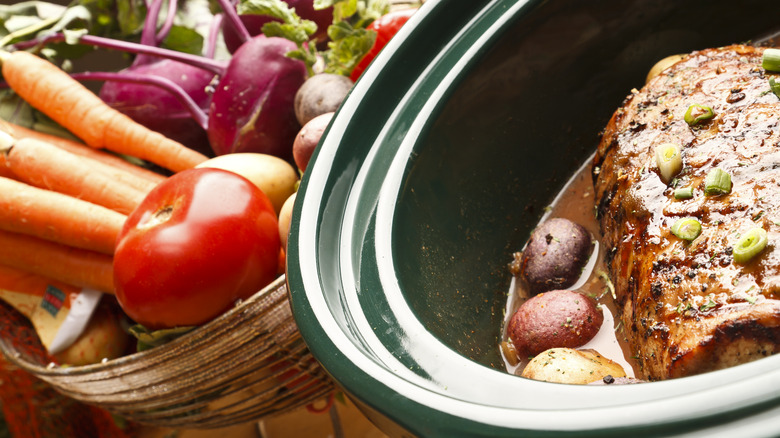What Are The Risks Of Leaving Your Slow Cooker On Overnight?
When audiences tuned in to "This Is Us" at the peak of the Pearson family's popularity in 2018, no one imagined the show would unlock a new fear of slow cookers. In a major plot twist, this household staple caused the TV family's home to go up in fatal flames. The aftermath was a real-world panic over using these countertop cooking tools at all, let alone leaving them on overnight.
Following the episode, Crock-Pot, a brand synonymous with slow cooking, issued a press statement published in Business Insider saying, "With over 100 million Crock-Pots sold, we have never received any consumer complaints similar to the fictional events portrayed." While that may be true, according to data collected by market research site Gitnux, slow cookers are responsible for 4.4% of all appliance-related fires.
The machines are generally safe when used properly and were designed to perform while you're out for the day, but is it a good idea to keep them cooking overnight? Well, yes and no. It turns out there's more to consider beyond the fear of fires.
How to keep your home safe when using a slow cooker overnight
When slow-cooking a recipe overnight, the greatest appeal is the promise of waking up to a perfectly cooked meal. However, there are a few risks. Leaving an appliance on when no one is home is one thing, but leaving it unattended overnight while your family is sleeping may raise some concerns. Though unlikely, the chance of electrical malfunctions, such as short circuits or a faulty switch on an older product, always poses a potential hazard.
Crock-Pot's statement to BI further explained that its cookers "are low current, low wattage (typically no more than 200 or 300 watts) appliances with self-regulating, heating elements," meaning they are designed to simmer over an extended time. Most modern slow cooker brands, from Hamilton Beach to Cuisinart, have models equipped with timers that can significantly reduce the likelihood of accidents.
Auto-off features are helpful to reduce the already low possibility of mishaps, but according to the National Fire Protection Association, regular maintenance and proper placement are essential. The NFPA recommends checking your appliances for frayed cords, and ensuring the slow cooker is in a place where it won't get bumped or where items could fall onto it that could cause a fire. Most importantly, double-checking your smoke alarm batteries is the greatest lifesaver.
Food safety tips for overnight slow cooking
Fires may seem like the most obvious threat when it comes to using slow cookers overnight, but food safety should be one of your top priorities as well. Improper temperatures can easily create an environment that breeds bacteria. Slow cookers are made to reach and maintain food-safe temperatures, but factors like uneven cooking, poorly prepared ingredients, power outrages, or mistimed auto-off switches may compromise safety if the food's internal temperature drops overnight.
When preparing to set up your slow cooker for an overnight recipe, thawing ingredients such as meat or poultry thoroughly beforehand, checking for proper temperature with a food thermometer, and refraining from overcrowding the cooker will all help mitigate risks and send you into your sweetest slow-cooking slumber with peace of mind. It may not hurt to double-check your bedside alarm as well — oversleeping could lead to overcooking and your would-be beef stew might end up more like beef jerky.


